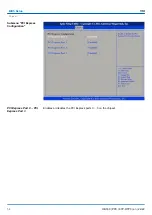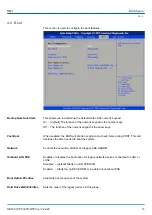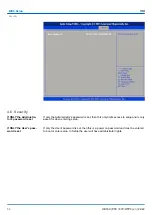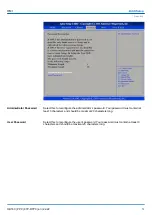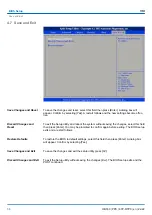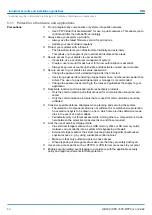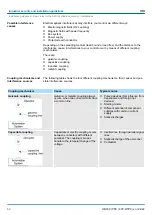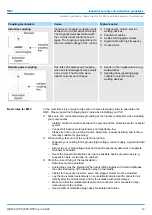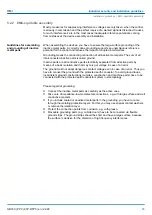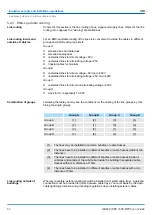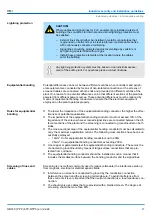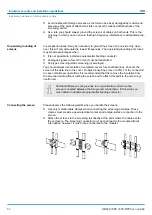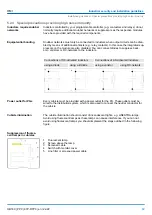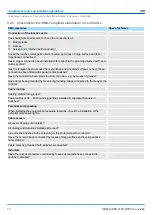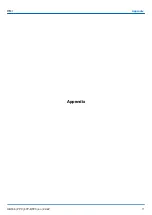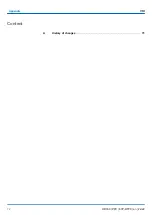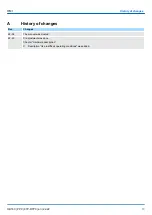
CAUTION!
Where cables and signal lines for PLC equipment are installed outside of
buildings, the conditions for internal and external lightning protection must
be satisfied.
–
Exterior lines should either be installed in metallic conduit pipes that
is grounded on both ends or in steel-reinforced concrete cable trunks
with continuously connected reinforcing.
–
Signal lines should be protected against overvoltage by varistors or
by lightning arrester filled with rare gas.
–
Install these protective elements at the location where the cables
enter the building.
Any lightning protection system must be based on an individual assess-
ment of the entire plant. For questions please contact Yaskawa.
Potential differences can occur between different sections when controllers and periph-
eral equipment are connected by means of non-isolated connections or the screens of
screened cables are connected at both ends and grounded on different sections of the
plant. One reason for a potential difference can be that different sections of the plant are
powered from different power sources. These potential differences must be reduced by
means of equipotential bonding conductors to ensure that the electronic equipment
employed on the plant operates properly.
n
The lower the impedance of the equipotential bonding conductor, the higher the effec-
tiveness of potential equalization.
n
The impedance of the equipotential bonding conductor must not exceed 10% of the
impedance of the screen where screened signal lines are connected between the dif-
ferent sections of the plant and the screening is connected to ground/neutral on both
sides.
n
The cross-sectional area of the equipotential bonding conductor must be calculated to
carry the maximum equalization current. The following cross-sections have been suc-
cessfully employed:
–
16mm
2
Cu for equipotential bonding conductors up to 200m
–
25mm
2
Cu equipotential bonding conductors exceeding 200m.
n
Use copper or galvanized steel for equipotential bonding conductors. These must be
connected to ground/neutral by means of large-surface connections that are pro-
tected from corrosion.
n
The equipotential bonding conductor should be installed in such a manner that it
includes the smallest surface between the bonding conductor and the signal lines.
Screening is one method commonly used to reduce (attenuate) the interference pick-up
from magnetic, electrical or electromagnetic fields.
n
Interference on screens is conducted to ground by the conductive connection
between the screen and the screening rain/enclosure. To avoid interference from
these currents it is very important that the neutral connection is a low-impedance con-
nection.
n
You should only use cables that are provided with a braided screen. The degree of
screening should be more than 80%.
Lightning protection
Equipotential bonding
Rules for equipotential
bonding
Screening of lines and
cables
HMI
Industrial security and installation guidelines
Installation guidelines > EMC-equitable cabling
HB160 | PPC | 67P-RTP0 | en | 22-22
67
Summary of Contents for 67P-RTP0
Page 1: ...PPC 67P RTP0 Manual HB160 PPC 67P RTP0 en 22 22 HMI Panel PC PPC015 IE...
Page 13: ...HMI Hardware description Structure Interfaces HB160 PPC 67P RTP0 en 22 22 13...
Page 71: ...Appendix HMI Appendix HB160 PPC 67P RTP0 en 22 22 71...
Page 72: ...Content A History of changes 73 HMI Appendix HB160 PPC 67P RTP0 en 22 22 72...


